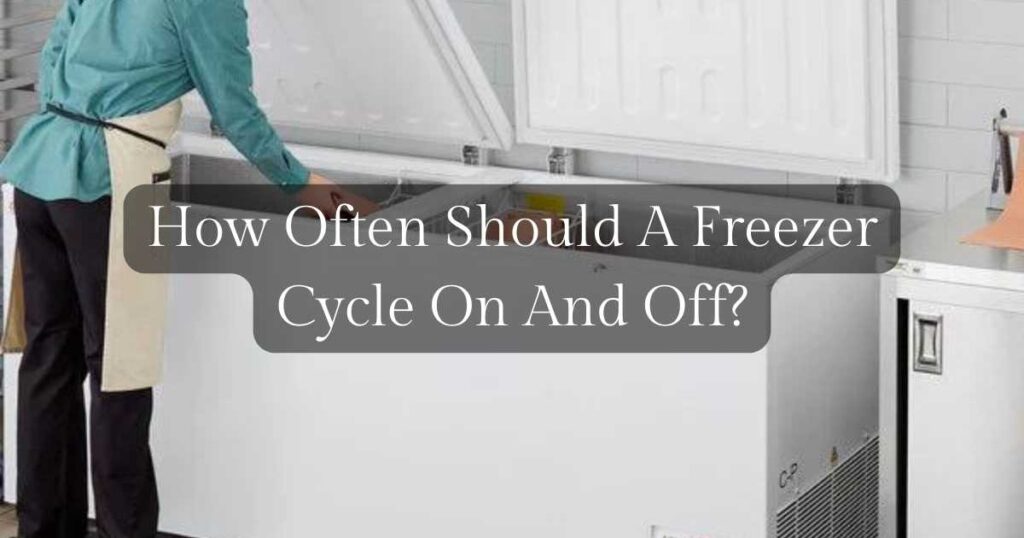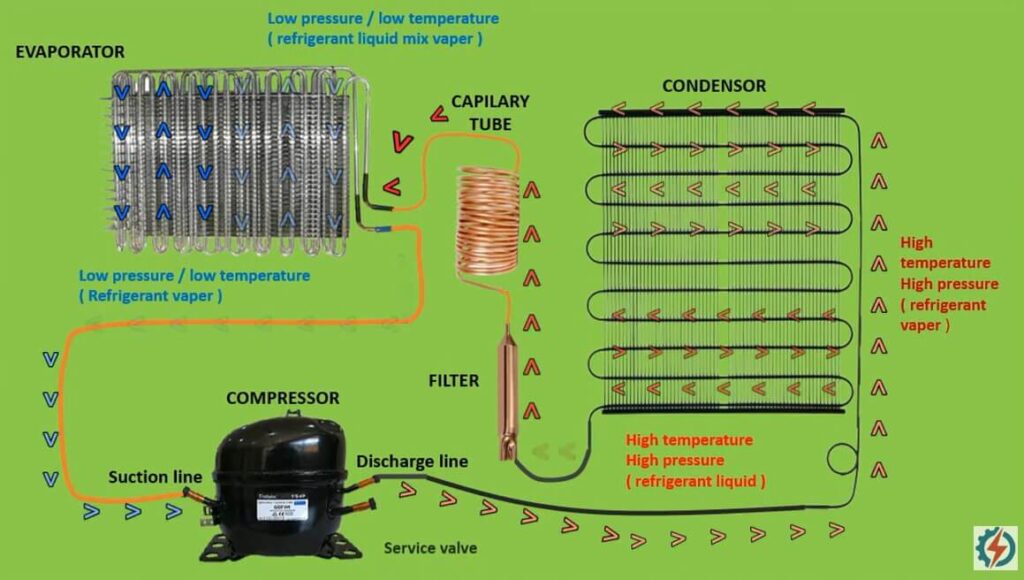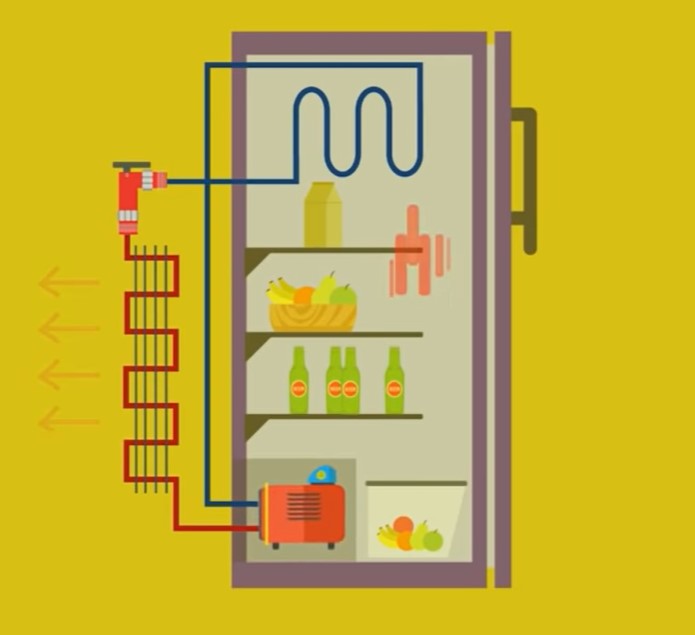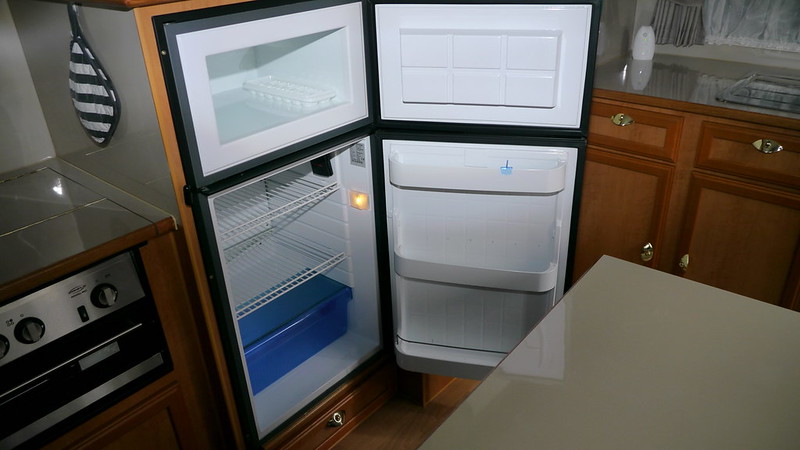A freezer should cycle on and off approximately every 30 minutes to maintain the desired temperature. Maintaining the proper functioning of a freezer is crucial to preserving food items and avoiding spoilage.
One important aspect of freezer operation is how often it cycles on and off. While there is no one-size-fits-all answer, as it can vary depending on factors such as the model, size, and location of the freezer, a general guideline is that a freezer should cycle on and off about every 30 minutes.
This cycle helps maintain the desired temperature inside the freezer, ensuring that food remains frozen and fresh for longer periods of time. Understanding how often should a freezer cycle on and off will help ensure optimal performance and energy efficiency.

What Is Freezer Cycling?
Freezer cycling is the process by which your freezer continuously runs and shuts off to maintain its temperature. This cycling is controlled by a thermostat that senses the temperature inside the freezer and adjusts the cooling accordingly.
As the temperature in the freezer rises, the thermostat signals the compressor to start running, cooling the freezer back to the desired temperature. Once the temperature drops to the set level, the compressor turns off, and the cycle starts again once the temperature rises.

Why Does A Freezer Cycle On And Off?
The primary reason behind the freezer cycling on and off is to maintain a consistent temperature inside the freezer. By cycling, the freezer can regulate the temperature and keep your frozen foods adequately preserved.
Additionally, cycling avoids excessive cooling and prevents the freezer from becoming too cold. This process not only ensures food safety but also helps in energy efficiency, as the compressor doesn’t need to run continuously.
Factors such as the ambient temperature in the room, the frequency of door openings, and the amount of food stored can affect how often the freezer cycles on and off. Understanding these factors can help you optimize the functioning of your freezer and keep your frozen goods in optimal condition.
But how often should a freezer cycle on and off? Well, there isn’t a one-size-fits-all answer to this question, as it depends on various factors. However, as a general rule, a freezer may cycle on and off every 30 minutes to a few hours.
This duration allows the freezer to maintain a stable temperature while avoiding excessive cycling that may strain the compressor and increase energy consumption.

Factors Affecting Freezer Cycling
Freezer cycling refers to the process of a freezer turning on and off as it maintains the desired temperature inside. The frequency of freezer cycling is an important consideration, as it can impact the overall performance and energy efficiency of the appliance.
Several factors come into play when determining how often a freezer should cycle on and off.
Temperature Settings and Freezer Size
The temperature settings of a freezer play a crucial role in determining how often it cycles on and off. The lower the temperature setting, the more frequently the freezer will need to run to maintain the desired coldness.
On the other hand, higher temperature settings may result in less frequent cycling. It’s important to strike a balance between the desired temperature and energy efficiency.
Moreover, the size of the freezer also influences its cycling frequency. Larger freezers tend to cycle on and off less frequently due to their increased storage capacity and better insulation. Smaller freezers, with limited space and insulation, may need to cycle more frequently to maintain the desired temperature.
Door Openings and Closings
One often overlooked factor that affects freezer cycling is the frequency of door openings and closings. Every time the freezer door is opened, warm air from the surroundings enters the freezer, causing the temperature inside to rise.
In response, the freezer will cycle on to bring the temperature back down to the desired level. The more frequently the door is opened, the more often the freezer will need to cycle.
To minimize unnecessary cycling, it is advisable to limit the number of door openings and closings. Additionally, ensuring a tight seal around the door can prevent warm air infiltration and reduce the frequency of cycling.
Amount and Type of Food Stored
Finally, the amount and type of food stored in the freezer can also impact its cycling pattern. A fully stocked freezer retains cold air better than an empty one, reducing the frequency of cycling as the stored items act as insulation.
Conversely, an empty freezer may need to cycle more frequently to maintain the desired temperature.
Moreover, the type of food stored can affect freezer cycling as well. Foods that freeze quickly and retain cold temperatures, such as frozen vegetables and meats, can help maintain a stable temperature and reduce cycling.
On the other hand, liquids and unfrozen items can introduce warm air and result in more frequent cycling.
Troubleshooting Common Issues
If you notice excessive cycling or other irregularities with your freezer, troubleshooting common issues can help identify and resolve the problem. Here are some common problems to be aware of:
| Issue | Possible Cause | Solution |
|---|---|---|
| The freezer cycles too frequently | The door seal is damaged or not properly closed. | Check the seal and replace if necessary. Ensure the door is fully closed. |
| Excessive frost or ice buildup | The freezer is not defrosting properly. | Defrost the freezer according to the manufacturer’s instructions. Check the defrost timer and heater if the issue persists. |
| Unusual noises coming from the freezer | The condenser fan motor or evaporator fan motor may be malfunctioning. | Inspect and replace the faulty fan motor if needed. Consult a professional if you’re unsure. |
By following these tips and troubleshooting common issues, you can effectively manage freezer cycling and optimize its performance.
Remember to regularly maintain and clean your freezer to ensure its longevity and the freshness of your frozen goods.
Do Freezers Cycle On And Off?
Yes, freezers cycle on and off to maintain a consistent temperature. The thermostat inside the freezer monitors the temperature and turns the compressor on and off as needed. When the temperature reaches the desired level, the compressor turns off.
Once the temperature rises above the desired level, the compressor turns on again. This cycle continues to keep the freezer at a constant temperature.
The frequency of the cycling depends on several factors, including the size of the freezer, the amount of food in it, and the ambient temperature. In general, freezers cycle on and off more frequently in the summer, when the ambient temperature is higher.
The cycling is normal and is not a sign of a problem. However, if your freezer is cycling on and off more frequently than usual, it may be a sign of a problem. Some possible causes of excessive cycling include:
- A faulty thermostat
- A dirty or blocked condenser coil
- A refrigerant leak
How often should a chest freezer cycle on and off?
The cycling frequency of a chest freezer depends on various factors such as the thermostat settings, ambient temperature, and usage patterns. Generally, chest freezers cycle on and off to maintain the set temperature.
In a moderate environment, they may cycle every few hours. However, during hotter conditions or frequent door openings, the cycling might be more frequent.
It’s essential to set the thermostat according to your needs and ensure proper ventilation around the freezer for optimal performance.
How Long Should A Freezer Run Between Cycles?
The length of time a freezer runs between cycles depends on a number of factors, including the size of the freezer, the amount of food in it, and the ambient temperature.
Generally, freezers cycle on and off more frequently in the summer, when the ambient temperature is higher. The compressor may run for as little as 5 minutes or as long as 20 minutes, depending on the size of the freezer and how much food is inside. In general, a freezer running for more than 20 minutes is a sign that there may be a problem.
Here are some of the factors that can affect how long a freezer runs between cycles:
- Size of the freezer: A larger freezer will have to run for longer periods than a smaller freezer in order to maintain a consistent temperature.
- Amount of food in the freezer: The more food in the freezer, the more work the compressor has to do to keep it cold. As a result, the compressor will run for longer periods.
- Ambient temperature: The higher the ambient temperature, the harder the freezer has to work to maintain a consistent temperature. As a result, the compressor will run for longer periods in the summer than in the winter.
- Defrost cycle: When the freezer defrosts, the compressor turns off. The defrost cycle typically lasts for a few hours.
If you are concerned about how often your freezer is cycling on and off, you can contact the manufacturer or a qualified appliance repair technician for assistance.

How long should a refrigerator run before shutting off?
The length of time a refrigerator runs before shutting off depends on a number of factors, including the size of the refrigerator, the amount of food in it, the ambient temperature, and the thermostat setting.
In general, refrigerators run for about 30-50% of the time. This means that they are running for about 6-12 hours per day. The actual amount of time will vary depending on the factors mentioned above.
Is A Freezer Supposed To Run Constantly?
No, a freezer should not run constantly. It should cycle on and off to maintain the desired temperature and save energy. If your freezer runs constantly, it may be a sign of a problem that needs to be addressed.
How Long Does A Freezer Need To Run Each Day?
A freezer typically needs to run for around 8 hours a day to maintain a proper temperature and preserve food.
How Often Should A Freezer Compressor Come On?
The frequency at which a freezer compressor comes on depends on various factors like the temperature setting, usage, and size of the freezer. Generally, a freezer compressor cycles on and off every 20 to 30 minutes to maintain the desired temperature inside the freezer.
Why Does My Freezer Stop Freezing Then Starts Again?
Your freezer may stop freezing due to various reasons, such as a malfunctioning thermostat or a blocked air vent. This interruption could be temporary, and the freezer might start freezing again once the issue is resolved.
Conclusion
Finding the right balance for your freezer’s cycling frequency is crucial for both energy efficiency and preserving your food’s quality. By following the general guidelines of a few cycles per hour and maintaining a stable temperature, you can ensure the optimal performance of your freezer.
Remember to also take into consideration the specific needs of your freezer and carefully monitor any changes in its cycling pattern. With proper care and attention, you can maximize the lifespan of your freezer and keep your food fresh for longer.
